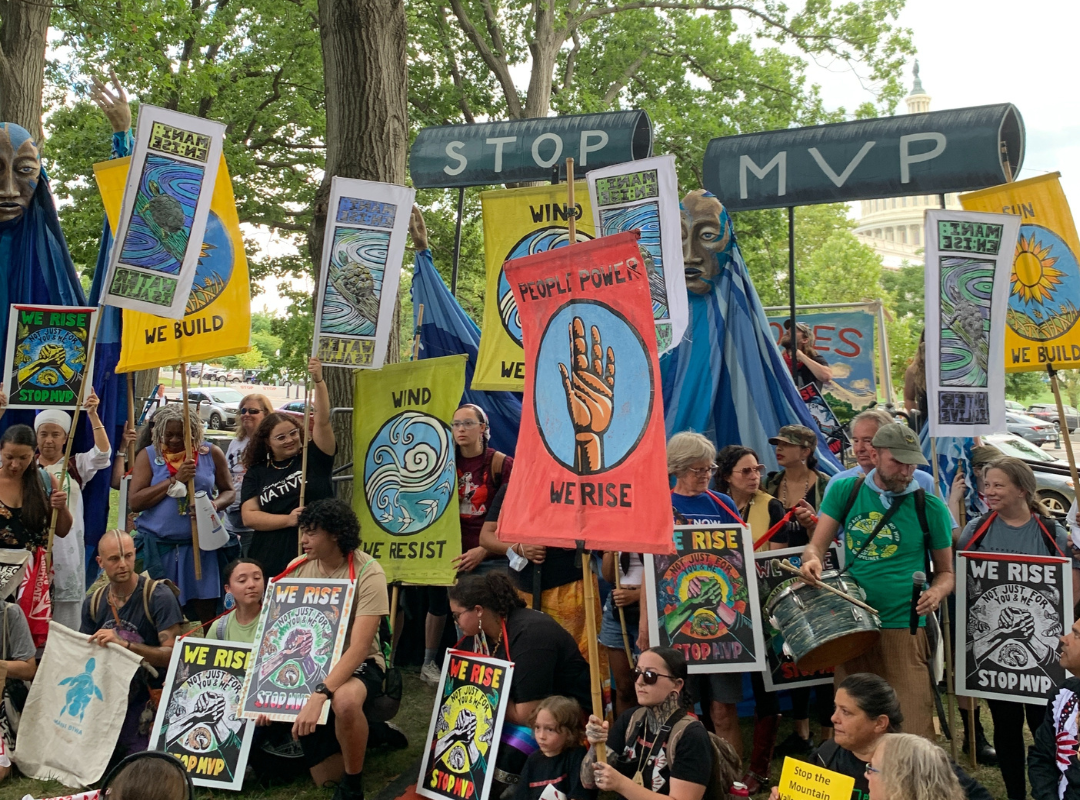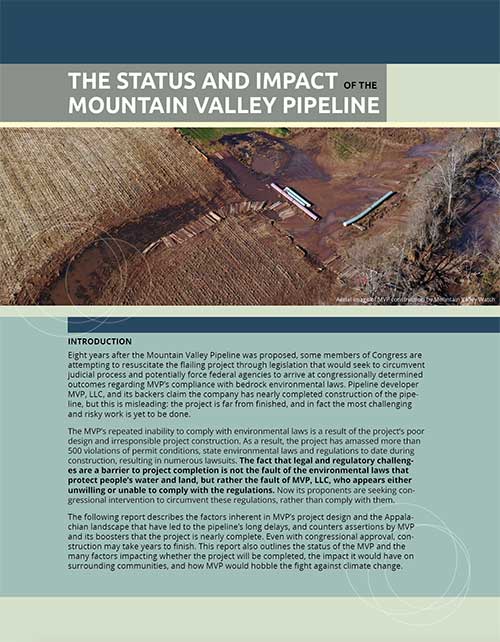Front Porch Blog
By Ridge Graham and Jessica Sims,
It’s a critical moment in the fight against the Mountain Valley Pipeline. The U.S. Senate and House will vote this week on a bill to keep the government funded after September 30. In exchange for West Virginia Sen. Joe Manchin’s vote on the Inflation Reduction Act — which became law in August — Senate Majority Leader Chuck Schumer made a side deal to include Manchin’s energy permitting bill in this must-pass government spending bill. Manchin released his Energy Independence and Security Act just last week, and now it’s time for our senators and representatives to vote against this dirty deal.
Long story short, Manchin’s so-called “permitting reform” bill is bad. It attempts to:
- Mandate completion of the Mountain Valley Pipeline, circumventing environmental law and the judicial process by ordering federal agencies to re-issue the substantially the same permits that federal judges already ruled violate the law.
The bill then attempts to prohibit any further judicial review of those permits that were vacated, along with any extensions or amendments to the project’s FERC certificate.This attempt by Congress to interfere with litigation over a particular project would set what Virginia Sen. Tim Kaine called “a very, very dangerous precedent” that “could open the door to serious abuse and even corruption.”
- Limit state and tribal authority to review any future harmful projects under the Clean Water Act. This would weaken a fundamental tool that state environmental agencies can use to protect their water quality.
- Require federal agencies to rush permit reviews, and limit — or even avoid — review under the National Environmental Policy Act. These measures would put a great amount of strain on federal agencies and limit their ability to thoroughly vet permits for polluting infrastructure, leading to poorly-informed decision-making. (Check out this summary from the Western Environmental Law Center for more information on how this bill would weaken the National Environmental Policy Act.)
Some proponents of the bill argue that provisions in the bill that address electric transmission lines are necessary to expedite the transition to clean energy. These efforts deserve consideration as part of an open legislative process, separated from the fossil fuel giveaways that form the backbone of this bill. And regardless of whether you believe Manchin’s proposal is good or bad (if it’s not abundantly clear, we are adamantly opposed), this kind of legislative coercion and back-room deal-making should be concerning. A proposal like this that cannot pass on its merits should not be forced through as part of a quid pro quo.
If passed, this bill would have devastating impacts on communities near the Mountain Valley Pipeline and people living near current and proposed energy projects everywhere — especially places where residents’ health and clean air and water is already being sacrificed for fossil fuel projects. Below, we’ve compiled ways you can get involved and take action during this all-hands-on-deck week.

On Sept. 8, 2022, hundreds of people rallied in solidarity with frontline communities from Appalachia, the Gulf, the Arctic and beyond in opposition to the side deal. Photo by Jen Lawhorne.
What you can do:
1. If you only have a minute, use our tool to send a letter to your representatives. Customize the subject line, and if you have time, customize the letter, too.
2. Call your legislators. Phone calls make an even greater impact. And it’s easy to do! See our sample script below.
You can call the U.S. Capitol switchboard at (202) 224-3121 to be connected to your legislators by an operator. Or, use this tool to find your U.S. senators’ phone numbers, and use this tool to find your U.S.House representative’s phone number.
“My name is ___ and I live in ___. I am calling to ask you to block Senator Manchin’s Energy Independence and Security Act and to help stop the Mountain Valley Pipeline. Environmental laws keep our communities safe. We can’t roll them back, especially with the growing threat of climate change. I hope your office will vote against this permitting bill.”
3. Join us, 7 Directions of Service and West Virginia Rivers Coalition for updates and to call our legislators together!
Tuesday, 9/27 at Noon EDT: Zoom registration | Facebook
Wednesday, 9/28 at Noon EDT: Zoom registration | Facebook
Status and Impact of the Mountain Valley Pipeline

4. Share your perspective and help get your legislators’ attention to the issue with a letter to the editor in your local newspaper!
Letters to the editor are typically around 250-300 words. Just Google search your paper of choice and “how to submit a letter to the editor” for tips on how to submit.
Letters to the editor are best when you use your own words – but we also want to make it easier for you with some basic structure to get you started! A good format for an LTE is three short paragraphs that cover a few basic things:
- Paragraph one: Provide background on the issue and explain why it’s pertinent. Note if the paper recently covered the issue — letters are more likely to be published if it’s in response to another letter, op-ed or article that was published.
- Paragraph two: Tell the reader what the problem is and why it’s a problem, including why you care and why others should care.
- Paragraph three: Explain what solution to the problem you want to see. This is a good place to name the legislators whom you want to act — legislative staff members keep tabs on when their bosses’ names appear in the news.
- Helpful tip: Don’t re-state the opposition’s points. Don’t waste your limited words on their viewpoints or repeating falsehoods — focus on your values and solutions, and what you want to see happen.
It bears repeating — it’s a critical moment in the fight against the Mountain Valley Pipeline. Yes, that’s a sentence we’ve written before, and it’s one we may very well write again. Opposing a behemoth project backed by multiple fossil fuel companies means that we’re often pushing hard against powerful interests to advocate for community input and protection of land, air and water.
But we’re not alone. Over eight years of standing up for our communities, water, land and air in the face of the Mountain Valley Pipeline and the proposed MVP Southgate extension, the movement has grown. Together we can and do make a difference. Thank you for taking action.
As always, to stay up-to-date on critical news and actions alerts, follow us on social media and join our email list. Also, stay tuned to our blog for a special guest column from a longtime community activist in the fight against the Mountain Valley Pipeline.
PREVIOUS
NEXT

Leave a comment
Your email address will not be published. Required fields are marked *

Leave a Comment